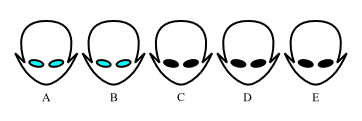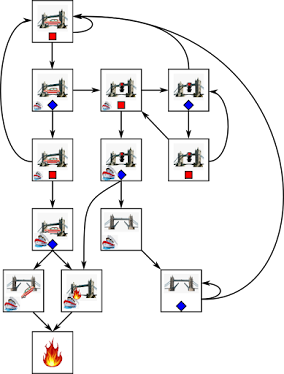Narrative constriction, and the zero sum game of complexity and meaning
I've finally reached a decent enough point in outlining my second draft of my WiP. I'll spare you the details of that process; it's a muddle of moving stuff around, throwing stuff out, putting new stuff in. But if there's any pattern that emerges from this chaos of decisions, it's something I'd call, for lack of a better term, narrative constriction.
You know it well, you've seen it many times in stories. The friendly ranger turns out to be a lost king. The sleuth takes the case because it will avenge her former partner. And the big evil dude in a black mask and cape turns out to be the protagonist's father. There are a few things to say about this.
First, the world we know doesn't work that way. I'm not complaining about the improbability of coincidences here. It makes sense, in each of those stories' universes, for the coincidence to happen; indeed, everything is arranged such that it wouldn't make sense, were the coincidence to be avoided. But I am complaining that in fact such associations tend to be rare in the world we actually live in. It's easy to get lost in some wilderness and die before meeting any another soul, let alone a particular king. A sleuth will go through the motions of her job like anyone else, with no case having a personal connection. And even when someone doesn't know who their father is, they'd find, if they cared to, that the poor fool was as average as anybody.
Second however, the best decisions I took during (re)outlining were powered by narrative constriction. Or at least, they felt the best, down to a visceral level that perceives a story in a way that's not articulate beyond saying, "this is right, this is true". Not only is nothing accidental, but things are connected through lines of purpose, identity, or another strong relation such as brought by blood or lust. The baby's parents were killed by the big bad. It's never a random goon who gives the hero a hard time at first; the goon turns out to also be the traitor. It's not random that the mantlepiece has a gun, because it will be needed later.
The above may not seem problematic to you, but I'm in that frame of mind where I believe an author has more than the responsibility to entertain. An author aims to influence the ideas of others, and to rational me it seems perverse to influence the way a person thinks towards something so unconnected with factual reality. Not like anyone needs much push towards thinking in narrative logic and magical terms; it's what we do by nature. And in a world increasingly complex, a world edging away from the old certainties of small communities and Newtonian physics, the mental shortcuts that served us well enough until now may turn out to be maladaptive.
There's two walls to a dilemma though, and in my case it's that I'm not that far gone into logic worship that I commit to always and only writing that which is sensible, reasonable, mathematically justifiable. While there is a part that tells me, that which atrophies our ability to handle complexity is to be avoided, there is also another part that says, so much the worse for complexity then. What makes us human are the stories we tell. And the great stories are all simple.
Take any myth you like. It's easy to imagine how it could be made more "complex" in its external aspect. Just invent two entities where the old myth has one. More often than not, the result is a weakening. The guy in the black mask and cloak could be anyone in the galaxy. But if he's the protagonist's father, then all of a sudden it's a stronger story. You don't expect someone to fight their father, on one hand, and on the other, we're all fighting our fathers, in a way. Not with lightsabers, perhaps, and most often not to the death; the duel of two fictional characters may resonate in any number of ways, individual to each spectator.
But it resonates, because of its simplicity-- because that simplicity is a magnet for all the depths we hide in ourselves. Scattered half-thoughts and images get woven together in a new pattern just by following along what someone else has written or enacted. Too much detail and that potency of association is lost.
That, I now believe, is the main argument for narrative constriction: it speaks to the deeper soul. Compared to it, the next practical one is a mere trifle, but for completeness I include it. Narrative logic is useful for the same reason laboratories are: because the world really is too complex to understand in its detail, and to understand is to parcel into observed and neglected anyway. And if working with spherical frictionless cows is good enough for physics, it's good enough for fiction to do away with as much of the accidental as it can.
So let the real world be a mess of accidents, and stories be webs of necessity. Connect plot points and characters-- nothing should be separate. The first draft may be a list of happy accidents you went through exploring your story, but the second draft must be where they make sense together.
You know it well, you've seen it many times in stories. The friendly ranger turns out to be a lost king. The sleuth takes the case because it will avenge her former partner. And the big evil dude in a black mask and cape turns out to be the protagonist's father. There are a few things to say about this.
First, the world we know doesn't work that way. I'm not complaining about the improbability of coincidences here. It makes sense, in each of those stories' universes, for the coincidence to happen; indeed, everything is arranged such that it wouldn't make sense, were the coincidence to be avoided. But I am complaining that in fact such associations tend to be rare in the world we actually live in. It's easy to get lost in some wilderness and die before meeting any another soul, let alone a particular king. A sleuth will go through the motions of her job like anyone else, with no case having a personal connection. And even when someone doesn't know who their father is, they'd find, if they cared to, that the poor fool was as average as anybody.
Second however, the best decisions I took during (re)outlining were powered by narrative constriction. Or at least, they felt the best, down to a visceral level that perceives a story in a way that's not articulate beyond saying, "this is right, this is true". Not only is nothing accidental, but things are connected through lines of purpose, identity, or another strong relation such as brought by blood or lust. The baby's parents were killed by the big bad. It's never a random goon who gives the hero a hard time at first; the goon turns out to also be the traitor. It's not random that the mantlepiece has a gun, because it will be needed later.
The above may not seem problematic to you, but I'm in that frame of mind where I believe an author has more than the responsibility to entertain. An author aims to influence the ideas of others, and to rational me it seems perverse to influence the way a person thinks towards something so unconnected with factual reality. Not like anyone needs much push towards thinking in narrative logic and magical terms; it's what we do by nature. And in a world increasingly complex, a world edging away from the old certainties of small communities and Newtonian physics, the mental shortcuts that served us well enough until now may turn out to be maladaptive.
There's two walls to a dilemma though, and in my case it's that I'm not that far gone into logic worship that I commit to always and only writing that which is sensible, reasonable, mathematically justifiable. While there is a part that tells me, that which atrophies our ability to handle complexity is to be avoided, there is also another part that says, so much the worse for complexity then. What makes us human are the stories we tell. And the great stories are all simple.
Take any myth you like. It's easy to imagine how it could be made more "complex" in its external aspect. Just invent two entities where the old myth has one. More often than not, the result is a weakening. The guy in the black mask and cloak could be anyone in the galaxy. But if he's the protagonist's father, then all of a sudden it's a stronger story. You don't expect someone to fight their father, on one hand, and on the other, we're all fighting our fathers, in a way. Not with lightsabers, perhaps, and most often not to the death; the duel of two fictional characters may resonate in any number of ways, individual to each spectator.
But it resonates, because of its simplicity-- because that simplicity is a magnet for all the depths we hide in ourselves. Scattered half-thoughts and images get woven together in a new pattern just by following along what someone else has written or enacted. Too much detail and that potency of association is lost.
That, I now believe, is the main argument for narrative constriction: it speaks to the deeper soul. Compared to it, the next practical one is a mere trifle, but for completeness I include it. Narrative logic is useful for the same reason laboratories are: because the world really is too complex to understand in its detail, and to understand is to parcel into observed and neglected anyway. And if working with spherical frictionless cows is good enough for physics, it's good enough for fiction to do away with as much of the accidental as it can.
So let the real world be a mess of accidents, and stories be webs of necessity. Connect plot points and characters-- nothing should be separate. The first draft may be a list of happy accidents you went through exploring your story, but the second draft must be where they make sense together.


Fascinating!
ReplyDeleteYes . . . it's occurred to me that stories are illuminating not in that they reproduce real life exactly, but in that they are a distillation or purification of experience -- just like, yes, the frictionless objects of physics.
And an amusing example: Edgar Rice Burroughs may have been the king of narrative constriction. I once saw a tabletop board game based on the Barsoom novels, and the instructions encouraged the players to amp up the coincidences. The line went something like: on Barsoom, if a hero, a villain, a beautiful girl, and a monster are all somewhere in a vast desert the size of Arizona -- you can be certain they will all end up at the same place, at the same time. :)
Rick
And in the Discworld, 1 in a million odds wins 9 times out of 10 ;)
DeleteCheers.